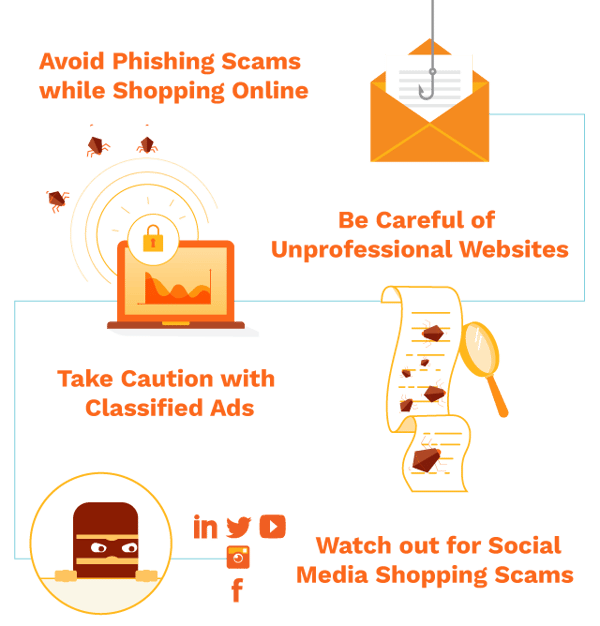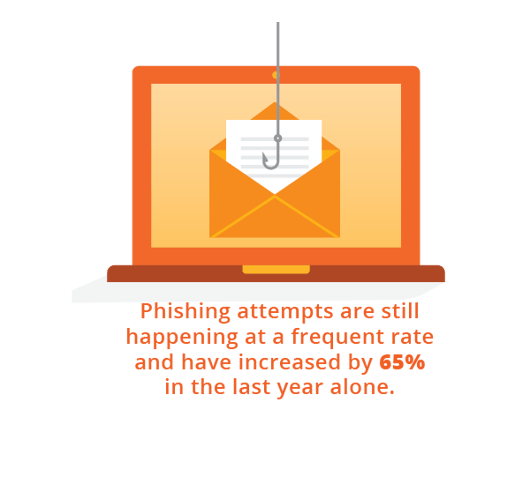These days who doesn’t do everything on their computer? Shopping, streaming movies, getting mail, all of it happens on our computers every day worldwide. Everything from educational institutions, business, and government agencies rely on computers and the connections that are made online all the time. Despite all of these amazing and wonderful benefits that have been brought to our lives, there are still some things to be wary of while being online. One of the most important things to be aware of while using your computer is the constant threats to the security of your personal information. Knowledge is power and with these tips and tricks, you can protect yourself and your computer from these common threats and scams.

1. Avoid Phishing Scams While Shopping Online
By sending emails that appear to originate from a reputable business, scammers trick victims into revealing personal information such as addresses, account logins, and financial information. Victims typically receive emails from scammers posing as legitimate mail carriers such as FedEx or UPS or as various government agencies and banks. These fraudulent emails ask you to click on a link or open an attachment which opens your computer up to a plethora of viruses. You’re more likely to open these emails after a recent purchase on an online store. They come in the form of an email saying in order to receive your package you need to open an attachment. Banks, postal services, government agencies, and businesses will never expect you to provide personal information to them via email or through an attachment, so never trust emails that want you to provide sensitive information in an unsecured way or expect you to open an attachment.
Be wary of emails you receive that “claim” to be from reputable institutions. Always double check with those institutions to make sure that whatever email you received is legitimate. When shopping online, only provide your credit card, billing, and shipping information directly through a company’s website that is secured. There are plenty of “phish” in the sea so make sure you avoid the phony ones by not clicking any direct links in an email from unknown parties or providing sensitive information. Remember, if it seems suspicious to trust your gut and double check with the bank, the post office, or anywhere else. 2. Be Careful of Unprofessional Websites
2. Be Careful of Unprofessional Websites
There are many online shopping sites for you to browse through. There are tons of small businesses all across the world that operate online and sell their items and services through the web. However, you should be careful around online shopping sites that are sloppy, unprofessional, or have multiple typos and grammer errors. These are typically websites run outside of the US and can potentially be associated with scammers overseas. A company that doesn’t put presentability and transparency as a design philosophy on their site are usually hiding something from you. These websites may sometimes also only take payment through wire transfer, which is another tell-tale sign of a scammer. Don’t trust an unprofessional or funny looking website unless you know for sure that it’s legitimate.
A way to make sure that the site you are visiting is legitimate and not a front is to ask yourself these following questions:
- Are there reviews available for this site/product/service?
- How old is this company?
- Are there grammar/spelling errors?
- Does the site provide quality images and good navigability?
- Are there secure payment methods such as a secure online checkout or PayPal?
 3. Take Caution with Classified Ads
3. Take Caution with Classified Ads
In the digital age, classified ads have shifted from newsprint to the web. Online ads are just a click away, but so are the many scams among them. Craigslist, Facebook, Offerup, and Letgo are some of the many websites and apps that allow people to sell anything from clothes to cars online like a garage sale. However, despite these new conveniences, there are many elements of risk involved with meeting online buyers and sellers. These are all great ways to get gifts or purchase items for a low cost but scammers frequently use these classifieds to post up items that were either stolen, fraudulent, or not even in their possession at all.
Recognize deals that seem too good to be true and always remember that your personal safety is the top priority; no deal is worth getting into trouble over. In general, never transfer or wire money for product you haven’t physically inspected yourself and seen in person. Exercise caution if you are paying for something and having it shipped to your house and withhold as much personal information as possible until you are sure that the person you are dealing with is safe and has the item you want in the condition you want it in.
4. Social Media Shopping Scams
Many online shopping scams now appear on social media platforms such as Facebook. By paying for sponsored posts, scammers can set up a fake online store and quickly gain exposure to large audiences. These operations typically operate for short periods of time, selling fake branded clothing or jewelry. These websites typically offer luxury products from well-known brands for very low prices. Sometimes you will receive an item that is fake or not as advertised; other times you won’t receive anything at all. In general, it’s a good idea to avoid online stores that are very new, and selling products at low prices. Look for the company’s terms and conditions of use, shipping details, and contact information. Verify that any existing reviews are real and authentic before purchase.

As a general rule of thumb, always remember that social media is a powerful tool to establish a presence quickly and efficiently. Many people can be exposed in a short period of time and this can cause a false sense of unity. In essence, a feeling of legitimacy from an illegitimate business that is validated by those it managed to trick. Don’t rush into making purchases and always be prudent about jumping the bandwagon.
Now more than ever in this vast and connected digital age online scams are becoming more prevalent and harder to notice. By installing updates to your computer and staying aware of phishing tactics, phony charities, and scams posted on online classifieds, you can defend yourself and your wallet. Be proactive in your defense and ward off any potentially harmful programs and scams by using these helpful tips.
Categories: Security, Shopping Scams, Online Scams











